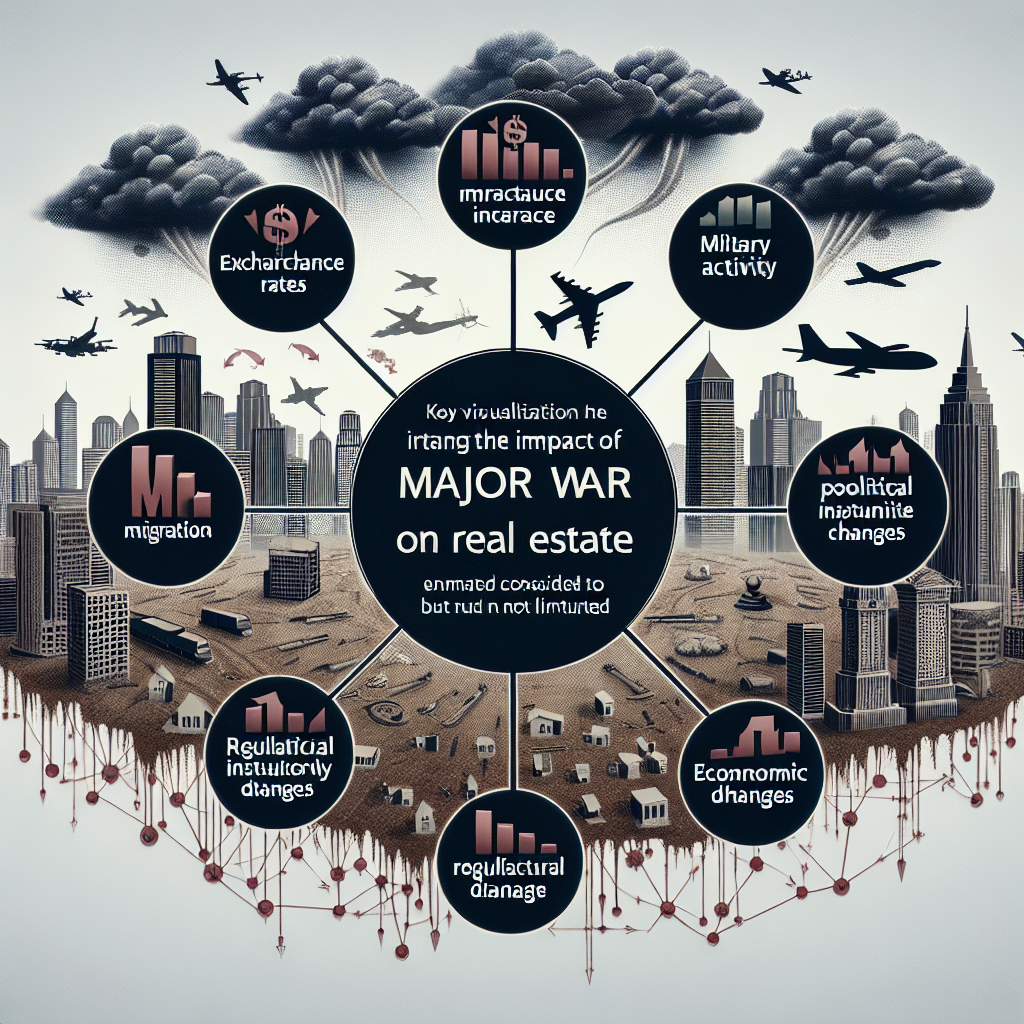-
Table of Contents
The Impact of Major War on Real Estate: 8 Key Factors to Consider

War has always been a significant disruptor of societies, economies, and infrastructures. One of the most affected sectors during and after major conflicts is real estate. The impact of war on real estate is multifaceted, influencing everything from property values to urban planning. This article delves into eight key factors to consider when examining the impact of major war on real estate, supported by relevant examples, case studies, and statistics.
1. Destruction of Property
One of the most immediate and visible impacts of war is the destruction of property. Bombings, shelling, and other forms of combat can lead to the complete or partial destruction of residential, commercial, and industrial buildings.
- Case Study: World War II – Cities like London, Berlin, and Tokyo experienced extensive bombing campaigns that left large swathes of urban areas in ruins. In London alone, the Blitz destroyed over a million homes.
- Statistics: According to the United Nations, the Syrian Civil War has resulted in the destruction of over 30% of the housing stock in cities like Aleppo and Homs.
The destruction of property not only displaces residents but also leads to a significant loss of investment and economic activity in the affected areas.
2. Displacement of Population
War often leads to the mass displacement of people, both internally and across borders. This displacement has a profound impact on real estate markets in both the areas people flee from and the areas they move to.
- Example: The Rwandan Genocide in 1994 led to the displacement of over 2 million people, significantly affecting the housing markets in neighboring countries like Uganda and Tanzania.
- Statistics: The United Nations High Commissioner for Refugees (UNHCR) reports that over 68.5 million people were forcibly displaced worldwide by the end of 2017, many due to conflict.
Displacement can lead to overcrowding in certain areas, driving up rental prices and straining local resources, while leaving other areas depopulated and economically stagnant.
3. Economic Instability
War often brings about economic instability, which can have a cascading effect on the real estate market. Inflation, currency devaluation, and loss of investor confidence are common during times of conflict.
- Example: The Yugoslav Wars in the 1990s led to hyperinflation in Serbia, making it nearly impossible for people to buy or sell property.
- Statistics: A study by the World Bank found that countries experiencing conflict see a decline in GDP growth by an average of 2.2% per year.
Economic instability can lead to a decrease in property values and a slowdown in real estate transactions, as both buyers and sellers become more risk-averse.
4. Changes in Land Use
War can lead to significant changes in land use, often driven by the need for military bases, refugee camps, and reconstruction efforts. These changes can have long-term impacts on real estate markets.
- Example: During the Vietnam War, large areas of land were repurposed for military use, affecting local agriculture and housing.
- Statistics: According to a report by the International Committee of the Red Cross, over 10% of agricultural land in Afghanistan has been repurposed for military use since 2001.
Changes in land use can lead to shifts in property values and alter the economic landscape of affected regions.
5. Reconstruction Efforts
Post-war reconstruction efforts can have a significant impact on real estate markets. These efforts often involve large-scale investments in infrastructure and housing, which can drive economic growth and increase property values.
- Case Study: Post-WWII Europe – The Marshall Plan provided over $12 billion (equivalent to approximately $130 billion today) for the reconstruction of Western Europe, leading to a real estate boom in countries like Germany and France.
- Statistics: A study by the European Bank for Reconstruction and Development found that post-conflict reconstruction can lead to GDP growth rates of up to 10% per year in the initial years.
Reconstruction efforts can revitalize real estate markets, but they also require careful planning and significant financial resources.
6. Legal and Regulatory Changes
War often leads to changes in legal and regulatory frameworks, which can impact real estate markets. These changes can include new property laws, land reforms, and shifts in governance structures.
- Example: After the fall of the Soviet Union, many Eastern European countries underwent significant land reforms, privatizing previously state-owned properties.
- Statistics: According to a report by the World Bank, land reforms in post-conflict countries can lead to an increase in property transactions by up to 50% within the first five years.
Legal and regulatory changes can create opportunities for investment but also pose challenges for property owners and developers.
7. Shifts in Demographics
War can lead to significant demographic shifts, including changes in population size, age distribution, and household composition. These shifts can have a profound impact on real estate markets.
- Example: The aftermath of the Bosnian War saw a significant decrease in the population of cities like Sarajevo, affecting housing demand and property values.
- Statistics: A study by the United Nations Population Fund found that conflict-affected countries often experience a “youth bulge,” with a higher proportion of young people in the population.
Demographic shifts can influence housing demand, rental prices, and the types of properties that are in demand.
8. Psychological Impact
The psychological impact of war on individuals and communities can also affect real estate markets. Fear, uncertainty, and trauma can influence people’s decisions about where to live and invest.
- Example: The ongoing conflict in Ukraine has led to a significant decrease in property transactions in conflict-affected areas, as people are hesitant to invest in uncertain environments.
- Statistics: A survey by the International Organization for Migration found that over 60% of displaced people in conflict zones cite safety concerns as their primary reason for not returning home.
The psychological impact of war can lead to decreased demand for property in conflict zones and increased demand in safer areas.
Conclusion
The impact of major war on real estate is complex and multifaceted, involving a range of factors from the destruction of property to psychological effects on individuals. Understanding these factors is crucial for policymakers, investors, and communities as they navigate the challenges and opportunities that arise in the aftermath of conflict.
Key takeaways include:
- The immediate destruction of property and infrastructure can lead to significant economic losses and displacement of populations.
- Economic instability and changes in land use can have long-term impacts on real estate markets.
- Reconstruction efforts and legal reforms can drive economic growth and create opportunities for investment.
- Demographic shifts and psychological impacts can influence housing demand and property values.
By considering these factors, stakeholders can better understand the dynamics of real estate markets in conflict-affected areas and make informed decisions to support recovery and growth.








